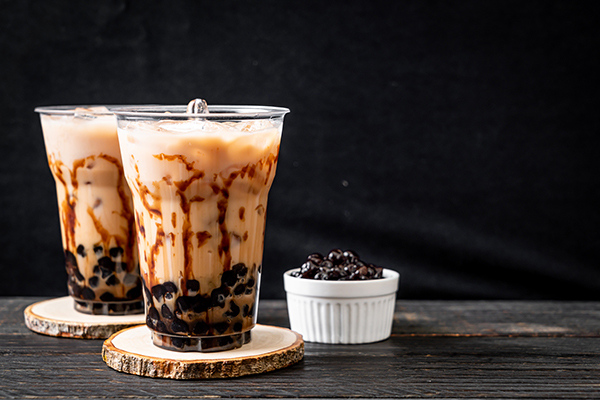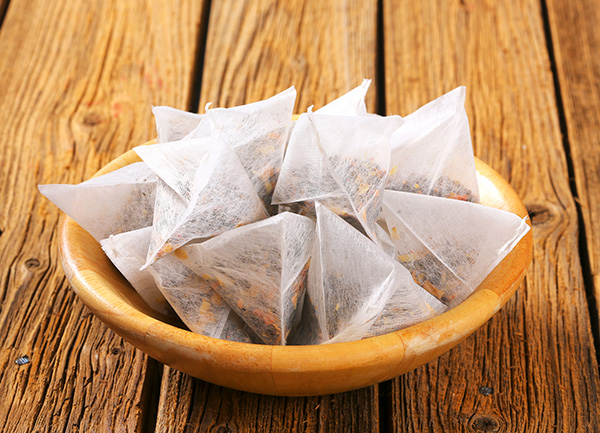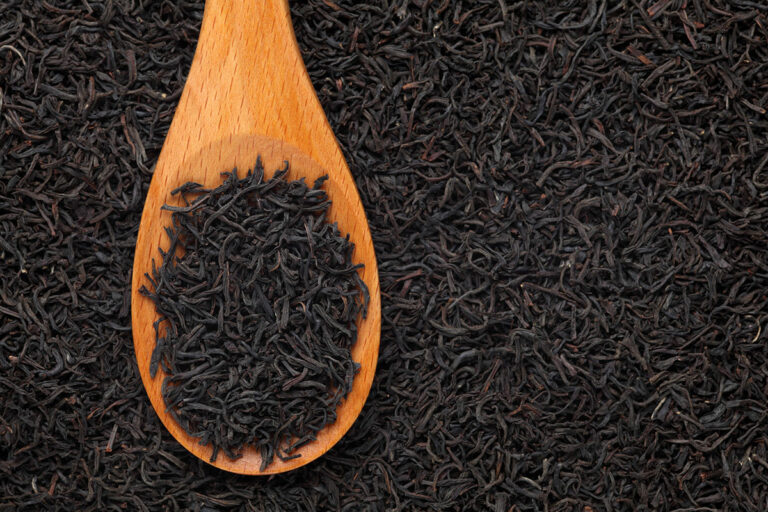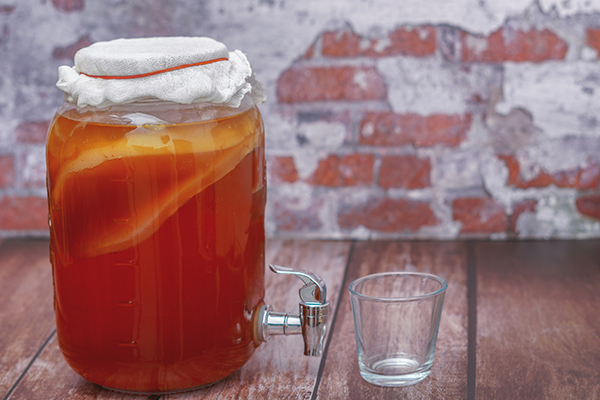10 Low Caffeine Teas: Ranged From Low to High
Searching for a calming drink that won’t disrupt your sleep at night? Many people aim to cut down on caffeine to enhance their sleep, alleviate anxiety, or simply feel more balanced throughout the day.
In this blog post, we will explore 10 low-caffeine teas ideal for a soothing cup of tea. We will also discuss factors that influence the caffeine content of tea and answer some frequently asked questions.
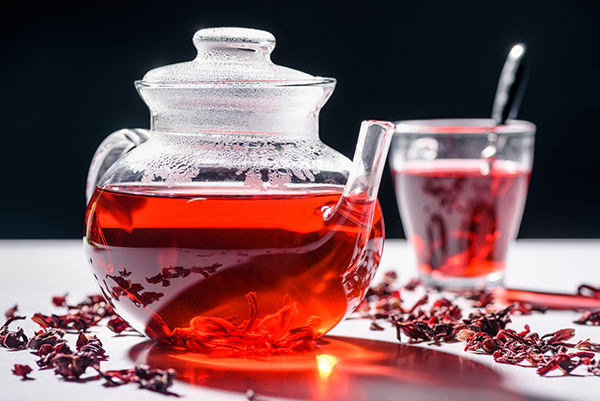

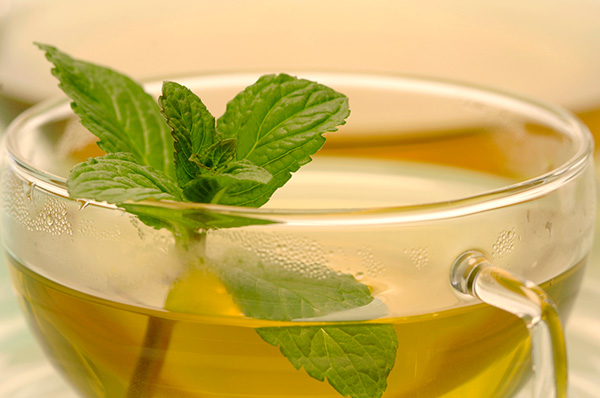
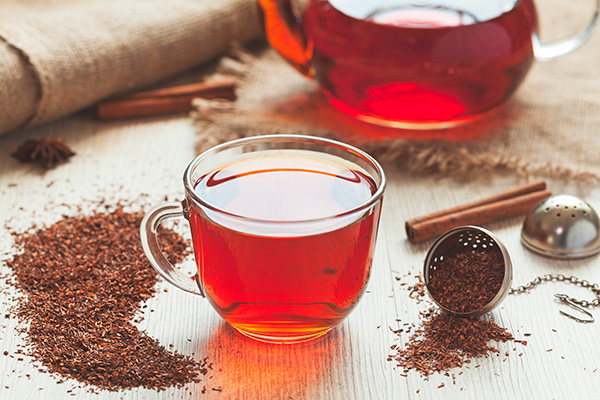

Which Tea Has the Least Caffeine?
Herbal teas generally have the least amount of caffeine. Why? Because they are not made from the Camellia sinensis plant, the root of caffeine content in teas like black, green, and oolong. Instead, herbal teas are naturally devoid of caffeine and made from various herbs, flowers, and spices.
Some popular herbal teas include:
- Chamomile tea
- Peppermint tea
- Rooibos tea (also known as red tea or red bush tea)
- Hibiscus tea
- Lemon balm tea
If you’re after a tea with the least caffeine content from the Camellia sinensis plant, white tea has the least caffeine. However, the exact caffeine level may vary depending on the processing method, brewing time, and temperature.
Teas With Low Caffeine Content
In the world of tea, caffeine content varies greatly. Some teas are naturally low in caffeine, while others have varying amounts based on factors such as processing and brewing time. The following table presents 10 different types of tea, sorted by their caffeine content.
| Type of Tea | Caffeine Content (mg per 8 oz cup) |
| Rooibos Tea | 0 |
| Ginger Tea | 0 |
| Chamomile Tea | 0 |
| Peppermint Tea | 0 |
| Rosehip Tea | 0 |
| Hibiscus Tea | 0 |
| Lemon Balm Tea | 0 |
| Red Raspberry Tea | 0 |
| White Tea | 15-30 |
| Green Tea | 20-45 |
| Oolong Tea | 30-50 |
Rooibos Tea
Rooibos tea, sometimes called red bush tea, is a naturally caffeine-free herbal tea originating from South Africa. The tea has a reddish-brown color and a sweet, gently nutty flavor profile. Rooibos is known for its rich antioxidants and low tannin content.
Caffeine Content: 0 mg per 8 oz cup

Ginger Tea
Ginger tea is a spicy, warming beverage made from the root of the ginger plant. It is often used to aid digestion, soothe sore throats, and relieve nausea. Ginger tea is devoid of caffeine and boasts a robust, zesty taste that can be enhanced with honey or lemon.
Caffeine Content: 0 mg per 8 oz cup

Chamomile Tea
Chamomile tea is made from the dried flower heads of the German or common chamomile plant. It is a popular herbal tea renowned for its soothing effects and is frequently used to aid sleep and relaxation. Chamomile tea is devoid of caffeine and features a mild, subtly sweet taste.
Invest in high-quality chamomile tea. Check out our expertly chosen list of top picks.
Caffeine Content: 0 mg per 8 oz cup

Peppermint Tea
Peppermint tea is made from the leaves of the mint plant. Its refreshing, minty flavor is often used to ease stomach discomfort and promote digestion. Peppermint tea is naturally caffeine-free.
Caffeine Content: 0 mg per 8 oz cup

Rosehip Tea
Rosehip tea is made from the fruit of the rose plant. It boasts a tangy, subtly sweet taste and is abundant in vitamin C and antioxidants. Rosehip tea is caffeine-free and can be savored either hot or cold.
Caffeine Content: 0 mg per 8 oz cup
Hibiscus Tea
Hibiscus tea is made from the dried flowers of the Hibiscus sabdariffa (roselle) plant. It has a tart, cranberry-like flavor and deep red color. Hibiscus tea has many potential health benefits. These include reducing blood pressure and boosting the immune system. On top of that, it’s naturally caffeine-free.
Caffeine Content: 0 mg per 8 oz cup

Lemon Balm Tea
Lemon balm tea is naturally caffeine-free and made of dried lemon balm leaves. It has a light green-yellow color, a refreshing citrus aroma, and a mild lemon-mint flavor.
Caffeine Content: 0 mg per 8 oz cup
Red Raspberry Tea
Red raspberry tea is made from the leaves of the red raspberry plant. It boasts a gentle, fruity flavor and is frequently used to promote women’s health, especially during pregnancy. Red raspberry tea is naturally caffeine-free.
Caffeine Content: 0 mg per 8 oz cup
White Tea
White tea boasts a delicate, subtle flavor with a hint of sweetness. In comparison to other true teas like green, oolong, and black, white tea is the least processed and has a lower caffeine content.
Caffeine Content: 15-30 mg per 8 oz cup
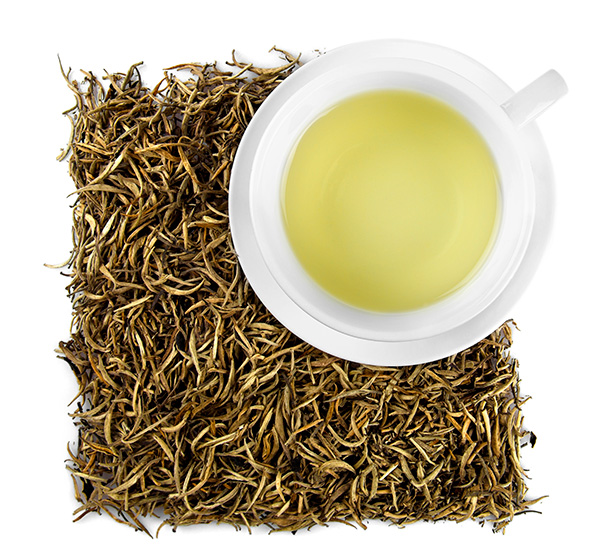
Green Tea
Green tea is made from leaves that have not been oxidized, resulting in a lighter flavor and color than black tea. Some varieties of green tea, like Sencha and Dragonwell, have less caffeine than others, like Matcha. Green tea is known for its health benefits, including antioxidants and potential weight loss support.
Caffeine Content: 20-45 mg per 8 oz cup

Oolong Tea
Oolong tea is a partially oxidized tea, falling between green and black tea in terms of flavor and caffeine content. It has a floral, fruity, or creamy flavor, depending on the processing method. Potential health benefits of oolong tea include aiding in boosting metabolism and improving heart health.
Caffeine Content: 30-50 mg per 8 oz cup
What Factors Influence the Caffeine Content of Tea?
Factors that can influence the caffeine content of tea include:
- The type of tea plant: Different tea plants have varying amounts of caffeine. For example, the Camellia sinensis plant, used for true teas like green, white, oolong, and black tea, naturally contains caffeine. On the other hand, herbal teas are made from various naturally caffeine-free plants.
- Processing method: The way tea leaves are processed can also affect caffeine content. For example, less oxidized teas like green or white generally have less caffeine than more oxidized teas like black.
- Brewing time and temperature: The time and temperature at which tea is steeped can impact its caffeine content. Generally, longer steeping times and higher temperatures extract more caffeine from the tea leaves.
Final Thoughts
Interested in reducing your caffeine intake? You have plenty of low-caffeine teas to consider. From naturally caffeine-free herbal teas to true teas with lower caffeine content, you will surely find a delicious and soothing option that suits your needs.
FAQ
Which Green Tea Has the Lowest Caffeine?
Among green teas, Dragonwell and other Chinese green teas generally have lower caffeine content compared to Japanese green teas like Gyokuro or Matcha. The way these teas are processed contributes to their varying caffeine levels.
What Teas Give You Energy Without Caffeine?
Although caffeine is often associated with increased energy levels, there are caffeine-free tea options that can provide a natural energy boost without causing jitters.
Herbal teas like ginseng, ashwagandha, or licorice root can help improve energy levels and reduce fatigue due to their adaptogenic properties. Other herbal teas like peppermint, ginger, or lemon balm can help increase focus and alertness.
Remember that individual responses to different teas vary. So try out a few and see which works best!

